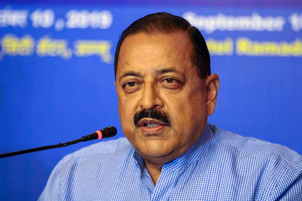Cabinet nod for National Quantum Mission

New Delhi, Apr. 19 (PTI) The government on Wednesday approved the National Quantum Mission to foster and scale up scientific and industrial research and development in quantum technology.
The work involves an outlay of Rs.6,003.65 crore from 2023-24 to 2030-31.
The National Quantum Mission (NQM), approved in a Union Cabinet meeting chaired by Prime Minister Narendra Modi, will accelerate quantum technology-based economic growth and foster ecosystem in the country.
“NQM is going to give India a quantum leap in this arena,” Science and Technology Minister Jitendra Singh told reporters here.
After the US, Austria, Finland, France and China, India will be the sixth country to undertake a dedicated quantum mission.
“The new work aims to build intermediate-scale quantum computers with 50-1000 physical qubits within eight years on various platforms such as superconducting and photonic technology,” he said.
Satellite-based secure quantum communication between ground stations up to 2000 km within India, long-distance secure quantum communication with other countries, quantum force distribution between cities over 2000 km, and multi-node quantum network with quantum memories. And some of the offerings of the work.
Singh said the work will help develop more sensitive magnetometers in nuclear systems and atomic clocks for precise timing, communication and navigation.
This will support the design and synthesis of quantum materials such as superconductors, novel semiconductor structures and topological materials for building quantum devices, Singh said.
Single photon sources/detectors and entangled photon sources will also be developed for quantum communications, sensing and metrology applications, he said.
Singh said four thematic centers (T-Hubs) will be set up in the fields of quantum computing, quantum communication, quantum sensing and metrology, and quantum materials and devices at national research and development institutes of excellence.
“Centers that focus on generating new knowledge through basic and applied research and promote R&D in their mandated areas,” the minister said.
Singh said the project could take the technology development ecosystem in the country to a globally competitive level.
This work will greatly benefit the communications, healthcare, financial and energy sectors, as well as pharmaceutical design and aerospace applications.
Singh said it will give a big boost to national priorities like Digital India, Make in India, Skill India and Stand-up India, Start-up India, Self-reliant India and Sustainable Development Goals (SDGs).

















